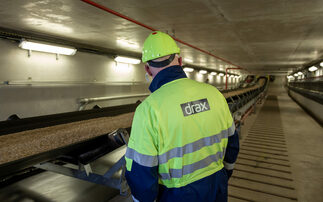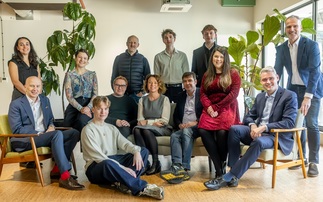From electric superbikes to waste food digestors, some of the UK's most promising cleantech start-ups gathered at BusinessGreen's offices last week to pitch their ideas to top investors
Across the country, there are thousands upon thousands of very smart people with great ideas - ideas with the potential to change the world. Tinkering away in garden sheds, concocting chemical formulas in underground labs, coding software in their bedrooms, inventors, innovators and entrepreneurs are working to change the course of history.
Nowhere is this more true than in the cleantech sector. Astounding progress is underway on everything from solar-clad buildings to superfast phone chargers.
With so much innovation happening, you may wonder why Britain isn't delivering more tech billionaires than Silicon Valley during the boom years. But to make a cleantech idea a reality you need more than talent and a good idea - you need a business plan and you need money.
And so late last week in BusinessGreen's central London offices, a day before the second BusinessGreen Technology Awards, we hosted the inaugural BusinessGreen Technology and Investment Forum in a bid to bring cleantech innovators and investors together to jointly explore the investment opportunities presented by the UK's fast expanding green technology sector.
The idea was to connect the best ideas in cleantech with those with the investment capital to make them happen. Over the course of the morning 15 of the UK's most promising green start-ups were invited to deliver four-minute pitches to a roomful of investors looking for the next big thing in cleantech innovation.
With the entrepreneurs fortified by some strong coffee - and the fear of being run off the stage by BusinessGreen editor-in-chief James Murray and his brass bell if they ran over their alloted four minutes - the event was a masterclass in the art of speed pitching. But it was not a case of speed over substance. The wide-ranging discussion served to illuminate some of the hottest trends driving the cleantech agenda in the UK today.
Waste emerged as a major area of innovation. From Topolytics, a data management service that aims to make industrial commercial waste "visible, verifiable and valuable" to SEaB Energy, which makes on-site anaerobic digestion units to turn organic waste into clean power, the pitching floor was aflood with inventive ideas to make better use of rubbish.
Unsurprisingly, smarter, more efficient home technology was also a rich area of innovation. For example, UK start-up Blume Labs has designed an LED lightbulb that promises double the efficiency of current LED bulbs on the market and 100,000 hours of light, while family firm Elansys specialises in intelligent switches and sensors to provide smart circuit breaking technology to even the oldest home or office. Co-founder David Chadwick told investors replacing traditional circuit breakers with smart switches could deliver similar returns as a switch to LED lighting over a three to five year period - impressive stuff for a tech product usually buried in a basement and forgotten about until a blackout hits.
Other entrepreneurs focused on trying to untangle a bigger problem in the energy system - managing supply and demand on a grid transitioning from large, centralised power stations to more decentralised and intermittent renewable sources of generation.
Upside Energy tackles this problem using advanced demand response technology. "We utilise any asset that inherently stores energy," explained Jason Rine, analyst at Upside Energy. "This includes home batteries and back-up power supplies. We charge these devices up when demand needs to be increased in the grid, and discharge these devices when demand needs to be decreased."
Others are taking a slightly more unusual approach. Stephane Lee-Favier outlined his vision for harnessing the power of mobile gaming to get people excited about home energy use. He is managing director at GenGame, a start-up with a mobile game that encourages people to dial down their energy use during times of peak demand by offering winners real-life prizes. With a trial underway in North East England, Lee-Favier believes mobile games will prove a crucial tool for engaging the public with the smart grid revolution.
The other big challenge of the low-carbon transition - transport - was tackled by two sustainable ventures boasting very different technologies. The Smart Green Shipping Alliance wants to make the shipping industry "fit for purpose" by transforming polluting vessels into cleaner steamers, complete with biofuel engines and automated sails.
Meanwhile, biking enthusiast Mike Edwards explained his plans to rev up the world of high spec motorbikes with a new electric motorbike that promises unparalleled speed and performance. Edwards, who is chief executive of Meteor Power, said once people try electric bikes they are usually bowled over by the driving experience. "It's like moving from an axe to a scalpel," he told investors. "You hear and feel what the tires are doing. You have nothing to interrupt your enjoyment and the performance of the bike."
But the event wasn't all about putting start-ups on the spot over the commercial viability of their ideas. Sage advice for entrepreneurs also came from Dr Mike Pitts of event sponsor Innovate UK who counselled start-ups to always keep a few key questions front of mind when drawing up their business plans. "Think really carefully about the customer," he said. "Who owns the problem? Who owns the problem and cares about it so much they are prepared to pay for it?"
"If you don't know how or why your customers are buying your product you're making money by accident," he warned.
Valuable insights were also dispensed by Andrew Thompson, partner and head of clean technology at Withers & Rogers, an intellectual property law firm that also sponsored the event. One of the most important things any cleantech start-up needs, he argued, is a plan to protect ideas from competitors. This is usually achieved with a mix of patents - which legally protect any idea or process from direct copies - and trade secrets, closely held formulas only those in your company know about. The trick is in getting the balance between patents and trade secrets right, Thompson said.
"Patents... are a very good way of crystallising value in a company," he explained. "[But] for the most part most strategies involve keeping a good amount of your technology back - you're going to have know how, processes, a secret recipe, whatever it might be. And that stuff is often much better kept as a trade secret."
While there were no trade secrets spilled at last week's event, it did offer an exclusive insight into the ambitions of some of the country's most promising young cleantech businesses. It seems the UK has the potential to become a world leader in everything from electric mobility to green waste disposal - our start-ups just need the confidence, and the cash, to make it happen.
The full list of companies presenting at the forum is available here.











